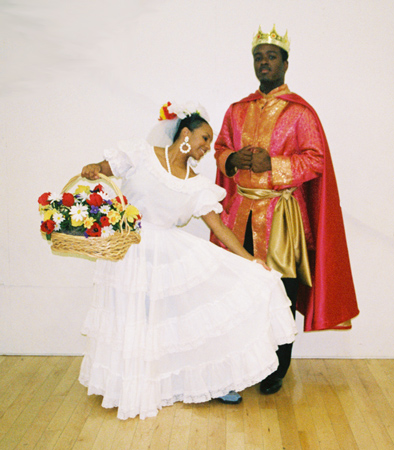












Puerto Rican Folkloric Dance

The History behind the Musical
16th to Early 19th Century
by Dr. Tekina-eiru Maynard (2004)
PUERTO RICO EVER AFTER, an original musical written by PRFDance Director
Ana Maria Maynard, is about a Prince from a far off land who sails the world in search of his true love and his call in life. In our story, the Prince discovers the island of Puerto Rico, and falls in love with a beautiful mountain cafetal (coffee plantation), the humble and hardworking Jibaros who grew and harvested the coffee, and of course, a sweet, humble mountain girl! Enjoy our historical investigation on 16th to early
19th century Puerto Rican history which we researched to create our story.

16th to Early 19th Century (Relevant Highlights)
Once upon a time in the mountains of Puerto Rico, Jibaros, humble and hardworking mountain people, worked the coffee planations and inland farms of Puerto Rico. The first coffee plant to cross the ocean to the Americas was brought by a French military captain in the 17th century. Along the journey across the wide ocean, the captain kept the little coffee plant alive by sharing his drinking water. Coffee was introduced to Puerto Rico in 1736 from Santo Domingo.
In 1765, the first census of the century revealed that the population on the island had increased sevenfold since the early 1700s and approximately 4600 farms now existed. In the early 19th century, the population increased yet again, attracted by land incentives to settle on the island. In those days, the spanish colony of Puerto Rico was not allowed to trade with anyone but Spain. Years of neglect by Spain to send trade ships encouraged the birth of clandestine trade on the Island. Contraband become the normal means of commerce for Puerto Rico, and coffee was a popular traded item.

At the beginning of the 19th century many immigrants arrived in Puerto Rico from Haiti and Dominican Republic escaping the unrest in Haiti. Other immigrants came from European countries attracted by land incentives offered by the Spanish crown. At this time in Haiti there were many wealthy European, especially French, plantation owners who had slaves. There were also many free persons of color, Blacks, who were wealthy plantation owners and who also owned slaves. Members of this economic elite sent their children to Europe to be educated. At the time of the Haitian unrest and independence struggle in the late 1790's many of these white and black wealthy plantation owners were killed and others lost their land and fled Haiti. The uncertainty of the times and the fear for their lives made many blacks and whites of all social and economic classes flee to Puerto Rico and other Caribbean islands.
During this turbulent period in history, Jibaros lived a hardworking but simple life high up in the mountains. They grew and harvested coffee, and survived on the native fruits and vegetables and the meager cash crops they were able to grow. The majority of coffee plantations were small. On these small inland farms, the owners and the jibaros worked together, creating a sense of community with close ties. The coffee harvest season lasted from August to January/February (depending how high up in the mountains you were). Jibaros traditionally celebrated the coffee harvest with joyful music and dance, and lively celebrations that lasted long into the night.
It is in this powerful, historical setting that "Puerto Rico Ever After" takes place. Don't miss this joyful musical!
HISTORICAL REFERENCES:
- Wagenheim, Kal and Jimenez de Wagenheim, Olga, "The Puerto Ricans: A
Documentary History," Markus Wiener Pub., 1996. (Before I read this book, I hated history. ;) A facinating book that presents history in the words of those who were there.)
- Jimenez de Wagenheim, Olga, "Puerto Rico: An Interpretive History from
Pre-Columbian Times to 1900," Markus Wiener Pub., 1998.
- Kal Wagenheim, "Puerto Rico: A Profile", Praeger Publishers, New York NY, 1970.
- Morales Carrion, Arturo, "Puerto Rico: A Political and Cultural
History," W. W. Norton & Company, Inc., 1983.
- "Corsican Migration to Puerto Rico in the 19th Century - Part 1," Wilfredo Santiago-Valiente, PhD, El Boricua, a cultural newsletter (www.elboricua.com), August 2003.
- "Bienvenidos," Puerto Rico Hotel & Tourism Association, Coral Publications, 1999.
- Castro Arroyo, MarĂde los Angeles and MarĂDolores Luque de SáSanchez,
"Puerto Rico en su historia: El rescate de la memoria," Rio Piedras, PR:
Editorial La Biblioteca, 2001.
- Pico Fernando, "Historia General de Puerto Rico," San Juan, PR: Ediciones
Huracan, 2000.
- Caldwell, Chris and Tad Ames, ed, "Insight Guides: Puerto Rico. APA
Productions", 1987.
- Website for Hacienda Buena Vista in Ponce, www.gicco.com/19thCentury.htm
- Interviews and teaching from Joquain Nieves Caldero, Folklorist from Corozal and Director of Guateque de PR, 2003.
We hold the banner high for Puerto Rico everyday!
Thank you in advance for your donation of any size!!
Become a SUSTAINING DONOR with a recurring MONTHLY donation!

Or DONATE through PAYPAL GIVING FUND (no fees are subtacted)!


For more information:
Dr. Ana María Tekina-eirú Maynard
Puerto Rican Cultural Center
Cultural Center Address: 701 Tillery Street #13,
Austin TX 78702-3738 (Map & Directions)
Mailing Address: 15228 Quiet Pond Court, Austin TX 78728-4555
Phone: +1.512.251.8122
Email: dance@prfdance.org
Web: www.prfdance.org
Facebook: www.facebook.com/prfdance
Copyright ©1997-2024 Puerto Rican Folkloric Dance, Inc. All rights
reserved. Terms of use.





